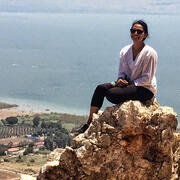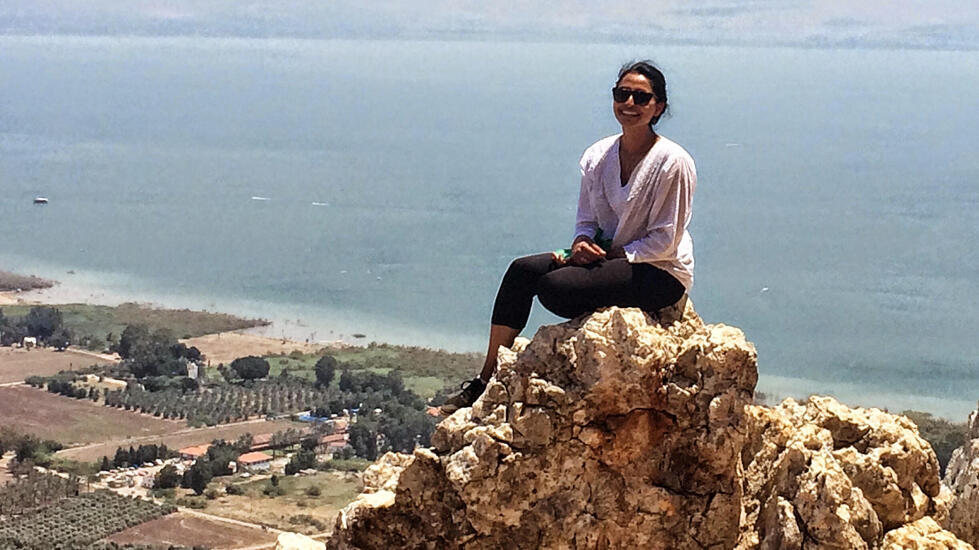
Medhini Kumar is a 2016 graduate of the CMES AM Program in Middle Eastern Studies. She currently works as Communications Manager for UNRWA USA, an American nonprofit that is committed to bettering the lives of Palestine refugees through advocacy efforts in the United States and fundraising for United Nations Relief and Works Agency for Palestine Refugees in the Near East (UNRWA) programs in the Middle East.
What is the mission of UNRWA USA?
UNRWA USA aims to promote a life of dignity and human development for Palestine refugees by informing the American public about UNRWA’s work and generating support for its programs in the Gaza Strip, the West Bank (including East Jerusalem), Syria, Lebanon, and Jordan. Ultimately, as an organization, we envision an America invested in the lives and dignity of Palestine refugees. Since we are based in the States, we do not directly implement programming, but rather support the Agency’s work in the Middle East through education, advocacy, and fundraising in the United States.
What are your goals and responsibilities as Communications Manager?
My role within the organization is to use storytelling, video, reporting, social media, among other forms of visual and written communication to shift the narrative around Palestine refugees and generate American support for UNRWA. In my time at UNRWA USA, I have been surprised how little the broader American public knows about UNRWA. Consequently, my responsibility is to educate others on the Agency’s active role in providing employment and humanitarian support for over 5 million Palestine refugees, the implications of the ongoing refugee crisis beyond the Middle East, and the importance of supporting its critical work.
The topics of Palestine, refugees, and funding for UN agencies are often politicized, especially here in the United States, making providing the most basic humanitarian services for at-risk populations incredibly difficult. The premise of my job is that by educating the public and amplifying refugee voices, more Americans will understand and empathize with their current reality and the consequences of the ongoing Nakba (“catastrophe” in Arabic, referring to the original displacement in 1948), and their desire to take positive action would also shift. One aspect of UNRWA’s work that I find especially fascinating and effective is that over 90 percent of UNRWA’s staff are refugees, themselves. So not only does UNRWA provide the education, healthcare, and social services that a government would normally provide, but it also empowers refugees through employment, allowing them to serve their own communities.

Where did you work before coming to UNRWA USA? What did you do at these institutions, how did these experiences prepare you for your current position?
Prior to working at UNRWA USA, I worked in various humanitarian capacities with international NGOs in Palestine, Jordan, and Iraq. During the summer between my two years at Harvard, I was a legal researcher at BADIL Resource Center for Palestinian Residency and Refugee Rights in Bethlehem. In addition to working on a report on forced displacement, I worked on the “Survey of Palestinian Refugees and Internally Displaced Persons (IDPs),” which analyzed the Palestinian refugee question from a historical, demographic, and socio-economic lens, while also touching on issues of humanitarian assistance, protection concerns, and durable solutions. This project, of course, heavily referenced UNRWA and its work for Palestine refugees since 1948. In addition, I spent that summer living in Aida refugee camp, allowing me to more intimately witness what life is like in a camp and also hear firsthand accounts of multiple generations of displacement. It was during this internship when I truly started to appreciate the value of storytelling in preserving Palestinian history and narrative, the lifeline UNRWA plays for Palestine refugees, and how to better advocate for refugee rights.
The experience that summer not only reinforced my interest in working at an organization that served refugees, but made me want to further examine the efficacy of humanitarian agencies and their role in providing protection for displaced persons. It informed my decision to work at REACH Initiative, where I worked on field assessments, maps, and reports to inform data-based humanitarian response to the crisis in Syria, and then at International Rescue Committee (IRC) in Iraq to work on protection-related issues facing internally displaced persons following the removal of ISIS from Mosul. When I joined UNRWA USA, my field experience helped me have a more realistic and fuller picture of what the realities and limitations are on the ground and how to use that knowledge to better support the work of field staff and beneficiaries.
Did you come to Harvard with a career path in mind? Did your time at CMES help clarify a career path for you?
I knew that I wanted to work on the issue of Palestine after graduation, though as a non-Palestinian, I felt it was not my place to approach it from a political or negotiations space. However, where I did see a place to create positive change was through the humanitarian and human rights spheres. Funnily enough, when applying for an AM at CMES, I believe, if memory serves, I included wanting work for UNRWA as part of my statement of purpose. So I find it quite serendipitous to find myself exactly where I wanted to be just a few years after graduating.
CMES’s flexibility in designing a course load that fit each individual’s academic needs helped me tremendously in balancing classes that gave me the practical skills I needed along with the historical and political context of the region. I took a fantastic course cross-listed through the School of Public Health entitled International Humanitarian Response. It was highly utilitarian in its approach and culminated in a weekend-long simulation in rural Massachusetts where we were assigned roles and had to respond to a simulated humanitarian crisis. It was only later when working in Iraq when I realized how helpful this course was in preparing me to think on my feet and ask the right questions when responding to crisis. In addition to this class, I took several courses at Harvard Law School and at the Fletcher School of Law and Diplomacy that reinforced my interests in human rights law and refugee protection.
What advice would you give to CMES students interested in nonprofit, foundation, or NGO work?
I think CMES’s greatest strength is its flexibility; students can dip into various departments and schools to curate their own individual curriculum. That said, when applying to jobs, you are competing with those who have a highly structured technical degree, whether that be an MPP or a law degree. Consequently, the onus is on the student to incorporate and build “hard skills” into his or her repertoire to compete with other master’s graduates. I found the best ways to do this was to take courses that focused on technical skills (for example, I took courses in econometrics, negotiations, and GIS) and to work either as a researcher for a professor on campus or intern at a nonprofit or NGO to pick up those practical skills that employers are looking for. I also highly encourage taking courses at other schools – it’s a great way not only to broaden your skill sets but also to build your professional network. Lastly, leverage your language skills and work abroad after graduating! It’s a fantastic way to gain experience and confidence. People assume all the jobs are in New York or DC, and while many are (including my current job), there are so many more opportunities available if you are willing to spend a few years outside the United States. It can be stressful and sometimes overwhelming, but you’ll meet fantastic people, get to see first-hand the impact that is possible, and be challenged in a way that’s not possible from a desk job in the United States.
